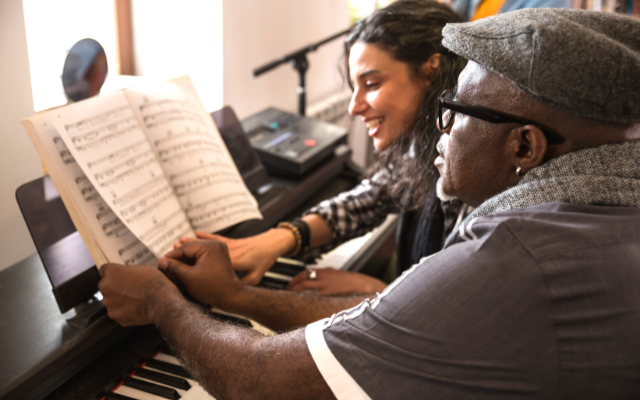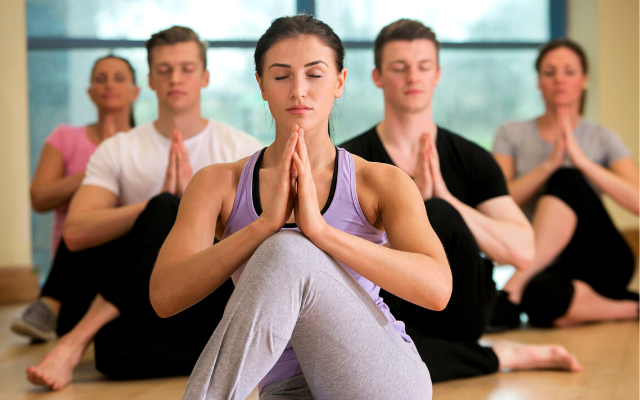Royal Life Centers offers several guest-centered activity therapies to guests to promote healing through creativity. These therapies complement our traditional individual and group therapy services by encouraging personal growth through artistic self-expression. Likewise, activity therapy approaches encourage new modes of thinking through hands-on activities that exercise different parts of the brain.
For this reason, activity therapy provides a different approach to healing from substance abuse that naturally encourages guests to explore their feelings in creative ways. With help from our experienced group facilitators, guests are able to process their feelings through healthy, creative activities.

What Is Activity Therapy?
Activity therapy, also known as expressive art therapy, often incorporates art, music, and journaling for therapeutic purposes. These therapies center on the individual and encourage relaxation, introspection, and creativity. As a key offering in our holistic approach to therapy, activity therapy provides a supportive environment for self-exploration and self-expression.
Activity Therapy In Rehab
In offering a wide range of activity therapy services, we help individuals gain insight into themselves and their recovery journey. This is because our expressive arts therapy groups focus on the act of self-expression and creation. Building upon the connection between art, healing, and wellness, activity therapy’s approach to healing encourages growth throughout treatment.
Our activity therapies include:
- Art therapy
- Music therapy
- Journal therapy
- Movement therapy
Through the use of artistic activities, our goal is for guests to have fun engaging in therapeutic activities that encourage personal growth and healing.
Each activity therapy session is led by our trained staff members and therapists, who ensure all activities are in line with our guests’ individual treatment plans. By expressing themselves through art, music, movement, or writing, our guests learn techniques they can carry with them even after their time in treatment.
Activity Therapy At Royal Life Centers
At Royal Life Centers, we believe intensive therapies are key to a complete healing process. Recovery is enriched and strengthened with each therapeutic opportunity taken. For this reason, we encourage guests to participate in therapeutic experiences that work best for them. Self-discovery is all part of the recovery process, which is why we feature therapies that allow guests to find meaning in activities that will ultimately help them stay sober and find meaning in their lives.
Our programs offer a unique opportunity for guests to engage in meaningful group work and creative activities that promote healing, self-expression, and growth. Our program is designed to provide a safe space where individuals can explore their experiences without judgment or fear. In turn, our activity therapies help our guests develop a greater understanding of themselves and learn valuable skills.
Through various activities such as art, music, journaling, and movement activities, our guests can develop a better understanding of their emotions, thoughts, and actions. Our program also provides comprehensive addiction treatment services to ensure that all our clients have the best chance at long-term recovery.
Our Activity Therapies

Art Therapy
Art therapy, such as painting, sculpting, and other forms of visual art, promotes the expression of unconscious feelings and thoughts and can facilitate self-discovery. Physiological emotions may manifest in artwork, which can relieve stress and help guests to manage anxiety and visualize new patterns of thought and emotion. Additionally, research shows that art therapy can be instrumental in treating disorders that co-occur with substance use disorder, such as depression, anxiety, PTSD, and ADHD.

Journal Therapy
Journal therapy can be very effective in helping to treat substance use disorder, as writing down feelings and thoughts helps guests to manage anxiety, reduce stress, and cope with depression. By recording emotions on paper, guests can learn to reduce the intensity of their emotional responses. Similarly, journaling helps guests to discover themselves while staying strong in their recovery efforts. Journal entries provide an opportunity for introspective reflection as well, as guests are able to look back on their thoughts and feelings and uncover patterns to gain insight.

Music Therapy
The connection between music and emotions can be a powerful one which is why Royal offers multiple music therapy courses. We have several seminar-style music groups with topics such as musical healing, where guests might experience a music-induced emotional release for themselves. For example, Sober Studios is our music therapy course in which guests write, record, and produce their own unique music.

Movement Therapy
At Royal Life Centers, we also believe in the power of movement therapy, which is why we offer mind-and-body activities like yoga. Yoga is a great way to incorporate mindfulness and meditation into your daily routine and has been found to relieve stress. Movement therapies increase self-reflection and self-awareness, promote healthier exercise and eating habits, foster emotional healing, and improve overall health and wellness. For instance, yoga may actually help the brain rebuild and rewire following neuronal disruptions caused by substance use.
Experiential Groups and Expressive Activities
Experiential therapy and expressive therapy techniques are incorporated into our activity offerings to provide a well-rounded source of healing for our guests. A foundational concept of experiential therapy is the idea that perception informs behavior. During activity therapy, counselors often use experiential techniques to help guests uncover and break down repressed emotions.
Similarly, expressive arts therapy techniques encourage guests to share and process feelings and memories within creative activities. For example, art therapy encourages participants to use materials such as paints and colored pencils to express themselves through visual art forms.
Activity therapy groups also utilize music therapy by combining the power of music with therapeutic techniques. In doing so, these groups promote relaxation as guests listen to and create their own music. Journaling can be used to explore thoughts and feelings in an organized manner.
All these activities are designed to help individuals gain insight into their emotions and behaviors, providing them with an increased understanding of themselves and the recovery process.
Building New Skills in Activity Therapy
As guests build and develop new artistic skills, they naturally learn healthy alternative habits that support self-soothing and healing. Studies show the benefical healing properties of artistic creative activities for those who struggle to cope with emotions.
During activity therapy, our activities provide guests with countless opportunities to work on mindfulness, emotional regulation, and communication skills.
Emotional Regulation Activities
In general, expressive therapies allow guests to find joy in the present and develop healthy coping skills. From practicing creative self-expression through art to processing thoughts through musical creation, these techniques provide an outlet for emotional regulation.
For example, art therapy encourages the use of paints and colored pencils to communicate inner thoughts through visual art forms. In doing so, guests who struggle to express themselves verbally gain new ways to process and release difficult emotions. As a result, our activity groups assist guests in reducing their stress levels while expressing themselves in a meaningful way.
Mindfulness Activities
During activity therapy sessions, our group facilitators assist guests in reframing their mindset to develop inner peace. For instance, yoga groups encourage guests to redirect their focus to the mind-body connection. By incorporating mindfulness meditation techniques, these activities encourage relaxation through a sense of oneness.
As individuals participate in mindfulness activities, they gain an appreciation for their experiences from a new perspective. For this reason, it is an effective tool to help foster personal growth and reach individual goals.
Activities for Collaborative Communication
These groups also guests help build relationships with peers in our addiction treatment programs. For instance, our music therapy groups encourage collaboration throughout the music-making process. As guests engage in songwriting and sound engineering activities, they collaborate with peers to develop musical works of art.
In general, expressive therapies allow guests to find joy in the present and develop healthy coping skills. From practicing creative self-expression through art to processing thoughts through musical creation, these techniques provide an outlet for emotional regulation.
The Benefits of Activity Therapy
By engaging in these types of activities, individuals can gain insight into their own strengths and areas for improvement. Activity therapy is a great way to learn more about oneself, increase self-confidence, discover new interests, and set goals for the future.
Some of the benefits of activity therapy include:
- Provides a safe space to process emotions
- Encourages inner contemplation
- Builds self-confidence in abilities
- Boosts self-esteem
- Reaffirms sense of identity
- Creates a sense of purpose
- Refocuses attention on healthy ideas
- Conjures up pleasant visual images
- Activates problem-solving skills
- Develops self-soothing techniques
- Naturally clears the mind
- Redirects attention from intrusive thoughts
- Channels feelings of sadness, anger, and anxiety
- Disengages thought spiraling
- Offers distance from negative feelings
- Puts worries into perspective
As guests build and develop new artistic skills, they naturally learn healthy alternative habits that support self-soothing and healing. Studies show the beneficial healing properties of artistic creative activities in improving emotional regulation and stress management skills.
Ultimately, activity therapy is beneficial for all types of individuals regardless of age, gender, physical strength, or mental abilities. With its holistic approach to healing, activity therapy looks at the whole person and helps them to gain a better understanding of their individual needs and goals in recovery.
Holistic Treatment At Royal Life Centers
At Royal Life Centers, activity therapy is an important element of our holistic approach to addiction treatment. Upon joining treatment at Royal Life Centers, our therapists, psychiatrists, and members of our clinical team collaborate with each guest to create their individualized treatment plans. These customized plans include multiple modalities of therapy such as traditional talk therapy and activity therapy. While selecting therapy offerings, our activity therapists assist guests in identifying their interests and finding therapeutic activities to meet their individual needs.
Collaborating with guests during the creation of their treatment plan offers an opportunity to build trust with treatment professionals and ensures that they are active participants in their recovery process. Additionally, we believe that engaging therapy activities help our guests explore meaningful interests, develop social skills, and experience a sense of accomplishment.
By incorporating activity therapy into our guest’s treatment plans, we hope to foster strong connections with their recovery community while providing a sense of accomplishment and success in reaching their goals. To engage each guest within our holistic treatment programs, we offer a variety of expressive arts and wellness activities. In doing so, we foster a safe and supportive environment for our guests to express themselves artistically and explore their interests in recovery.




